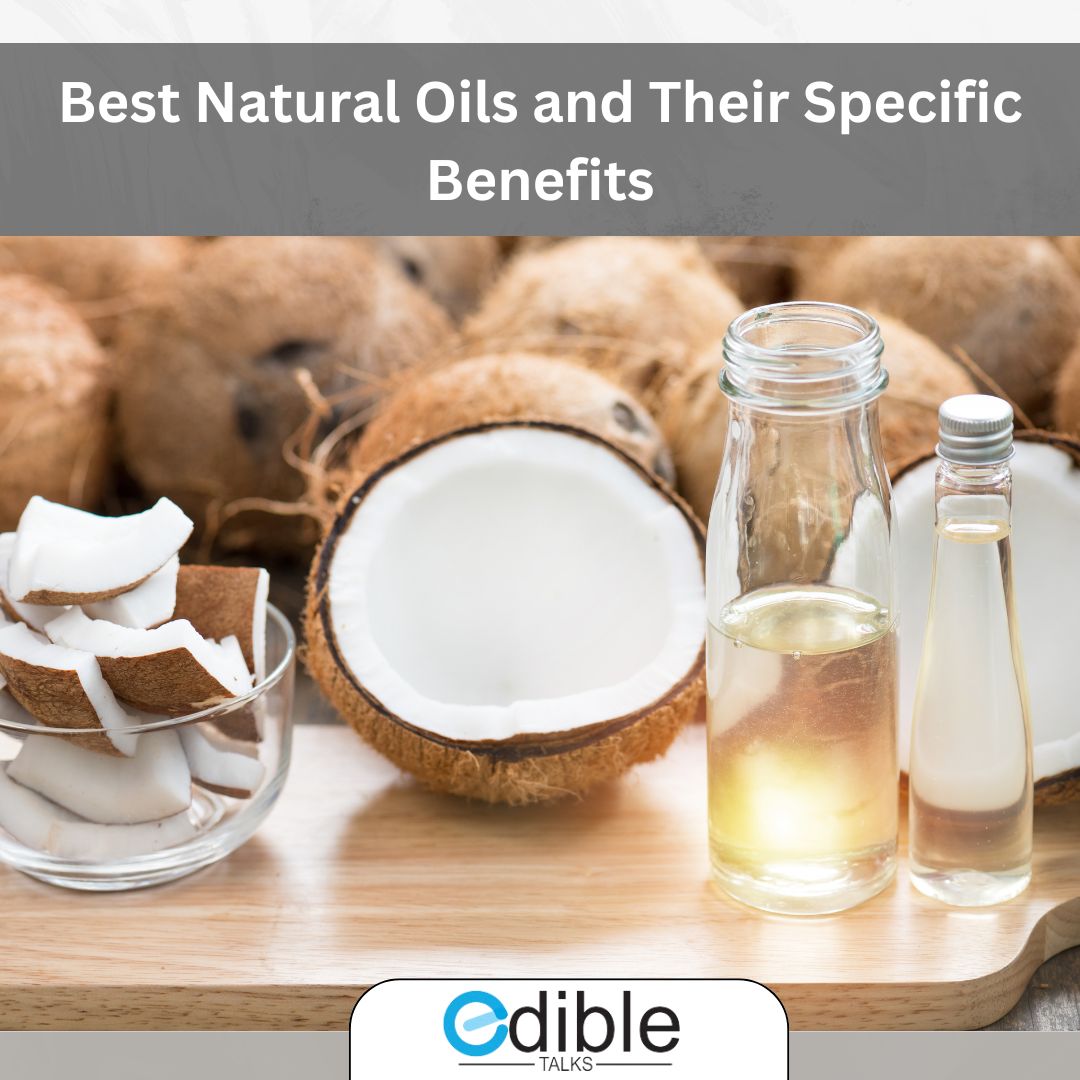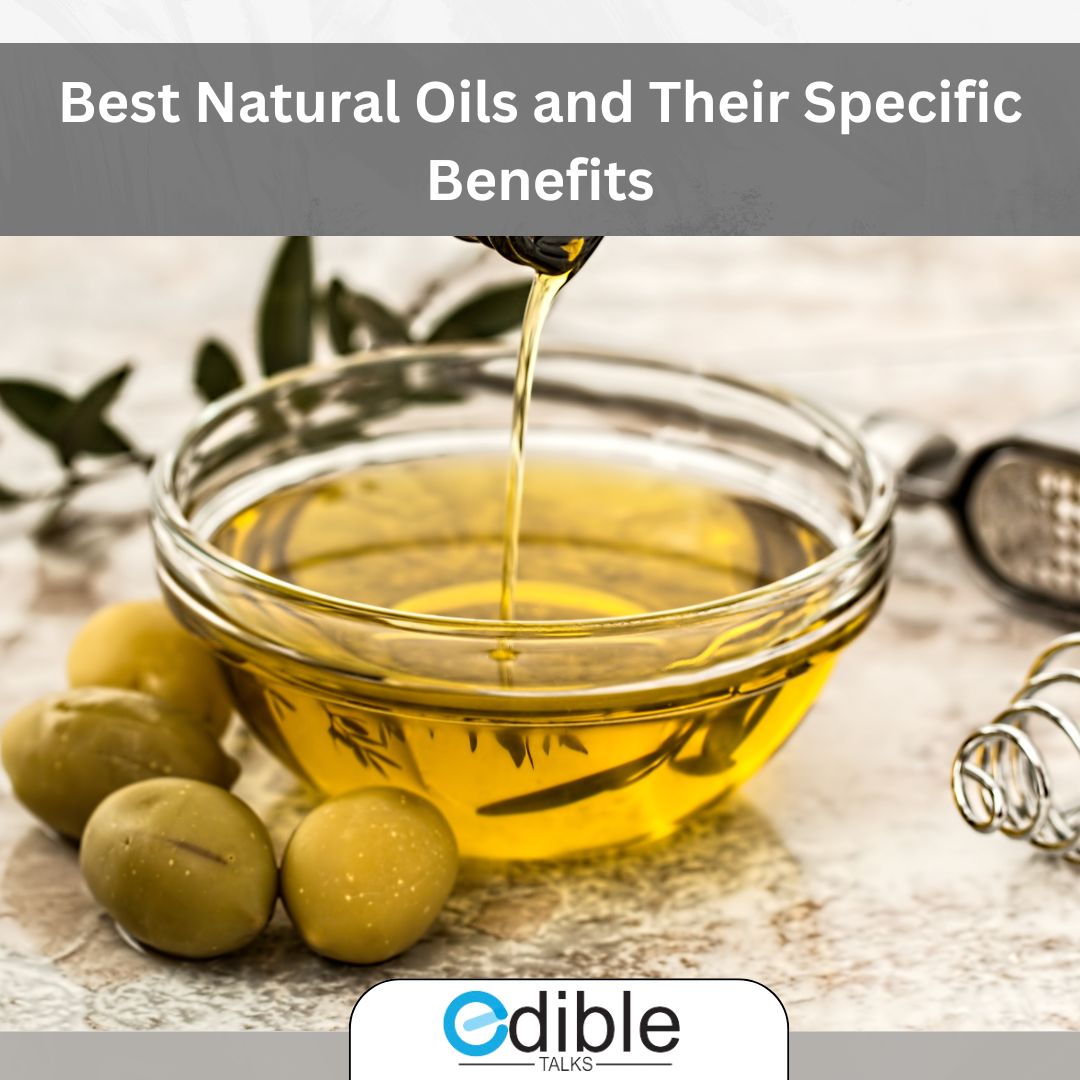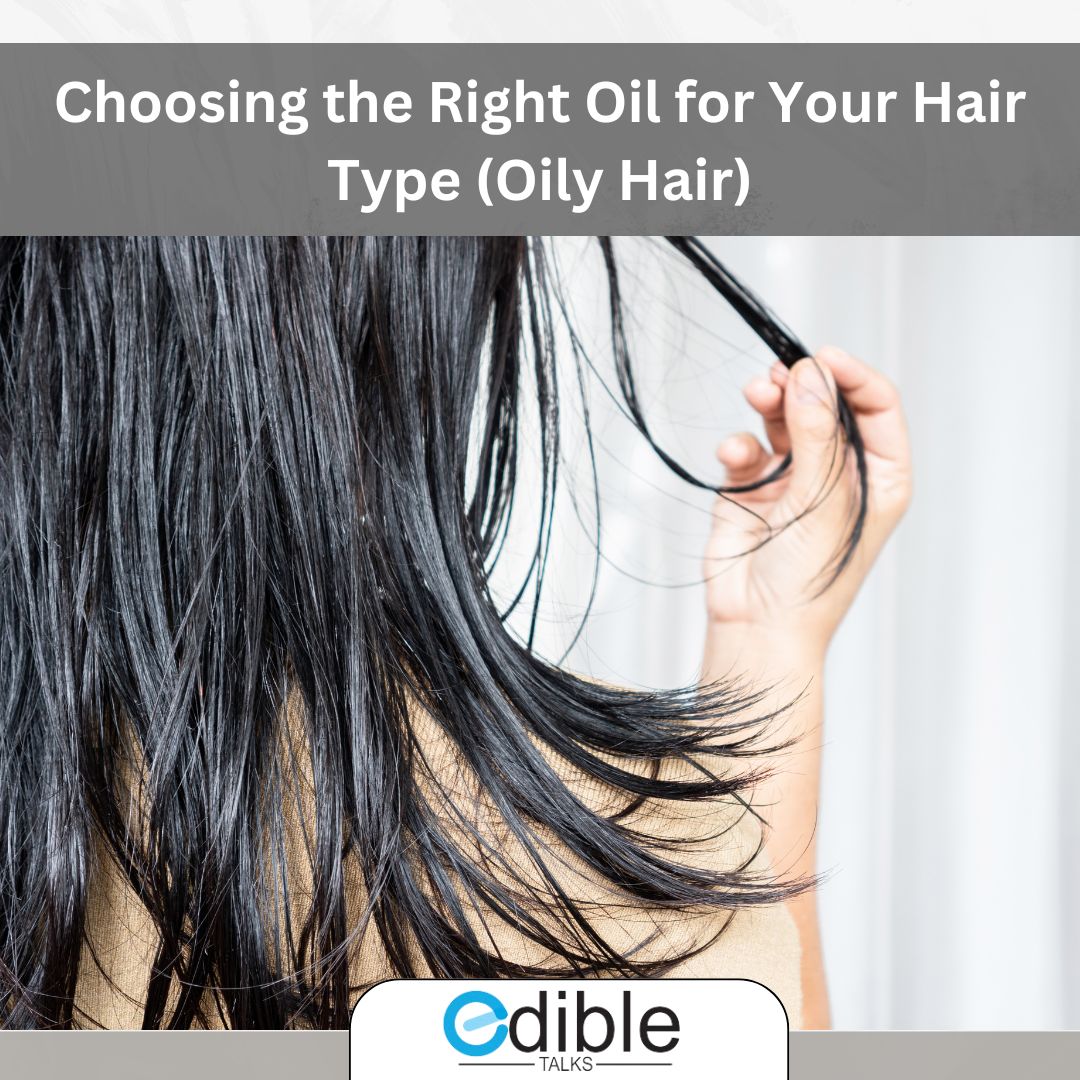The Benefits of Using Best Natural Oils for Hair Routine
If you’re looking for a natural way to achieve stronger, shinier hair, you’ve come to the right place. At Edible Talks, we love exploring the power of natural ingredients, and when it comes to hair care, nothing beats the magic of natural oils. From deep nourishment to repairing damage, these oils can transform your hair without the use of harsh chemicals. In this post, we’ll dive into the Best Natural Oils for Hairs that promote healthier, shinier locks and how you can incorporate them into your routine for maximum benefits. Let’s get started on your journey to luscious, vibrant hair—naturally!
Introduction
Are you troubled by dryness, frizz, and breakage in your hair? If yes, then natural oils are the solution to all your hair woes. Using natural oils is a great way to make your hair healthy, strong, and shiny. There are many natural oils available today, each with its own unique benefits. In this blog, we will discuss the benefits of using natural oils in hair care.
Understanding The Best Natural Oils for Hairs Health
Natural oils have been used for hair care for centuries. They contain nutrients that help to make hair healthy and strong. Here we take a closer look at how these oils work and what benefits they have for hair health:

1. How natural oils work:
Emollient Properties:
- Natural oils coat the hair shaft, locking in moisture and preventing dryness. This property makes hair soft and flexible.
- These oils smooth the outer layer of the hair (cuticle), making it shiny and tangle-free.
Nutrient Delivery:
- Natural oils are rich in vitamins, fatty acids and antioxidants. These ingredients are essential for hair growth.
- For example, vitamin E strengthens hair, while fatty acids provide moisture and nutrition to the hair.
Protective Barrier Formation:
- Natural oils form a protective layer on the hair that protects it from environmental damage, such as sun rays, pollution, and heat.
- This layer also protects the hair from chemical treatments, such as hair dyeing and styling.
2. Common Hair Problems That Natural Oils Can Solve:
Dryness and Dehydration:
- Natural oils provide deep moisture to the hair, which eliminates dryness and dehydration.
Frizz and Flyaways:
- These oils smooth the surface of the hair, which reduces tangles and keeps flyaways under control.
Split Ends and Breakage:
- Natural oils strengthen the hair, which reduces the risk of split ends and breakage.
Scalp Issues:
- Some natural oils have antifungal and antibacterial properties, which help relieve dryness, itching, and other scalp problems.
Lack of Shine:
- Natural oils provide a natural shine to the hair, making it look healthy and beautiful.
3. Choose the right oil for your hair type:
- Each oil has its own properties, so it is important to choose an oil according to your hair type.
- For example, light oils, such as jojoba oil, are suitable for oily hair, while heavier oils, such as coconut oil, are better for dry hair.
Best Natural Oils and Their Specific Benefits
Natural oils are a great gift for hair health and beauty. The nutrients they contain help make hair strong, shiny, and healthy. Here are some popular natural oils and their specific benefits:
1. Coconut Oil:

Deep Moisturizing:
Coconut oil absorbs deeply into the hair and provides moisture.
Preventing Protein Loss:
This oil preserves hair proteins, which makes hair stronger.
Scalp Health:
Coconut oil keeps the scalp healthy and removes dandruff.
Use:
Use before or after shampooing. A warm oil massage is also useful.
2. Argan Oil:
Shine and Softness:
Argan oil makes hair shiny and soft.
Frizz Control:
This oil keeps frizzy hair under control.
Heat Protection:
Protects hair from heat when applied before styling.
Use:
Use after shampooing or before styling.
3. Jojoba Oil:
Mimics Natural Sebum:
This oil acts like the hair’s natural oil, balancing oil production.
Scalp Health:
Jojoba oil keeps the scalp healthy and helps with hair growth.
Use:
Massage into scalp or use as a conditioner.
4. Castor Oil:
Hair Growth:
Castor oil promotes hair growth.
Strengthening Hair:
This oil strengthens hair follicles.
Adding Thickness:
Adds thickness to hair.
Use:
Massage onto scalp and leave on overnight.
5. Almond Oil:
Rich in Vitamin E:
Almond oil is rich in vitamin E, which keeps hair healthy.
Shine and Softness:
This oil makes hair shiny and soft.
Strengthening Hair:
Strengthens hair.
Use:
Apply after shampooing or on the ends of the hair.
6. Olive Oil:

Moisturizing:
Olive oil provides deep moisture to the hair.
Strengthening Hair:
Strengthens hair.
Scalp Health:
Keeps the scalp healthy.
Use:
Massage with warm oil or use as a conditioner.
7. Grape seed Oil:
Light Oil:
This oil is light and suitable for oily hair.
Moisturizing:
Provides moisture to the hair.
Adding Shine:
Makes hair shiny.
Use:
Use as a leave-in conditioner.
8. Rosemary Oil:
Hair Growth:
Promotes hair growth.
Scalp Health:
Keeps the scalp healthy.
Use:
Massage into the scalp with a carrier oil.
Each oil has its own properties, so choose an oil according to your hair type and needs. Regular use of natural oils can make hair healthy and beautiful.
How to Incorporate Natural Oils into Your Hair Care Routine
There are several ways to incorporate natural oils into your hair care routine, allowing you to reap their benefits. Here are some easy ways:
1. Pre-shampoo treatment (oil mask):
- Before shampooing, apply natural oils to your hair and scalp.
- It is more effective to apply the oil after it has been slightly warmed.
- Leave the oil on for 30 minutes to an hour, then wash it off with shampoo.
- This method is very useful for dry and damaged hair.
2. Leave-in conditioner/serum:
- After shampooing and conditioning, apply a small amount of natural oil to the ends of your hair.
- This oil will moisturize your hair and make it shiny.
- This method also helps to control frizz and prevent split ends.
3. Scalp Massage:
- Take natural oil on your fingers and gently massage your scalp.
- The massage improves blood circulation in the scalp, which promotes hair growth.
- This method is also helpful in relieving dryness and itching.
- Oils like rosemary or lavender oil are great for this purpose.
4. Hot Oil Treatment:
- Warm the natural oil slightly (do not overheat it).
- Apply the warm oil to your hair and scalp.
- Cover your hair with a warm towel and leave it on for 30 minutes to an hour.
- Then wash it off with shampoo.
- This method is very useful for dry, damaged and weak hair.
5. Adding oil to existing hair care products:
- Add a few drops of natural oil to your shampoo or conditioner.
- This method will make your hair care products more effective.
- You can also add your favourite oil to your hair mask.
6. Application and dosage tips:
- Always use a small amount of oil. Using too much oil can make your hair greasy.
- Apply the oil thoroughly from the roots to the ends of your hair.
- After applying the oil, massage your hair with light hands.
- Choose the oil according to your hair type.
Choosing the Right Oil for Your Hair Type
Natural oils for hair are very beneficial , but not every oil is suitable for every hair type. Choosing the right oil can improve the health and beauty of your hair. Here is a description of the Best Natural Oils for hair types:

1. Oily Hair:
Oily hair is best suited for light oils that do not leave an excessive amount of oil on the scalp.
Jojoba Oil:
This oil acts like the natural oil of the hair and balances oil production.
Grape seed Oil:
This light oil moisturizes the hair and adds shine, without being greasy.
Tea Tree Oil:
This oil keeps the scalp clean and reduces oiliness. (Use it with a carrier oil)
2. Dry Hair:
Heavy and moisturizing oils are suitable for dry hair that provide deep moisture to the hair.
Coconut Oil:
This oil provides deep moisture to the hair and prevents protein loss.
Argan Oil:
This oil makes the hair shiny and soft and controls tangles.
Olive Oil:
This oil provides moisture to the hair and makes it strong.
Avocado Oil:
This oil is rich in vitamins and fatty acids and moisturizes dry hair.
3. Fine Hair:
Light oils are suitable for fine hair that do not weigh down the hair.
Jojoba Oil:
This light oil provides moisture to the hair and does not weigh it down.
Grape seed Oil:
This oil provides moisture to the hair and makes it shiny.
Almond Oil:
When used in small amounts, this oil provides moisture to fine hair.
4. Thick Hair:
Heavy oils are suitable for thick hair that can be absorbed deep into the hair.
Coconut Oil:
This oil provides deep moisture to thick hair.
Castor Oil:
This oil strengthens thick hair and promotes growth.
Avocado Oil:
This oil provides moisture to thick hair and makes it soft.
5. Damaged Hair:

Oils that repair and strengthen hair are suitable for damaged hair.
Argan Oil:
This oil repairs damaged hair and makes it shiny.
Almond Oil:
This oil strengthens damaged hair and makes it soft.
Castor Oil:
This oil strengthens damaged hair and promotes growth.
Important tips:
- Always use pure and natural oils.
- Use oil in small amounts.
- Warm the oil slightly before applying.
- Choose the oil according to your hair type.
Possible Precautions and Precautions
Natural oils are very beneficial for hair, but there are some things to keep in mind when using them. Here are some possible precautions and precautions for Best Natural Oils for Hairs:
1. Patch Testing for Allergies:
- Before using any new oil, test it on a small area of your skin (such as the inside of your wrist).
- Wait 24 hours and see if there is an allergic reaction.
- Do not use the oil if it causes itching, redness, or irritation.
2. Avoiding Overuse:
- Overuse of oil can make hair oily.
- Use a small amount of oil and apply it well from the roots to the ends of the hair.
- If you have oily hair, use a light oil and use it in small amounts.
3. Quality of Oils:
- Always use pure and natural oils.
- Cold-pressed and organic oils are best.
- Avoid oils with chemicals and additives.
- Store oils in a cool, dark place.
4. Potential Interactions with Hair Dye or Treatments:
- If you have dyed your hair or had any chemical treatments, consult your hairstylist before using oils.
- Some oils can lighten hair colour or reduce the effectiveness of chemical treatments.
- Be especially careful if you have had a keratin treatment, as some oils can affect this treatment.
5. Scalp Sensitivity:
- If you have a sensitive scalp, use light oils and do not leave the oil on your scalp for too long.
- Always mix strong oils like tea tree oil or rosemary oil with a carrier oil (like coconut or almond oil).
6. Caution During Pregnancy and Breastfeeding:
- Some oils are not safe to use during pregnancy and breastfeeding.
- Consult your doctor before using any new oil.
7. Eye Protection:
- Protect your eyes when applying the oil.
- If the oil gets in your eyes, rinse immediately with water.
Conclusion
Natural oils are a great and natural solution for hair health and beauty. The nutrients they contain help make hair strong, shiny, and healthy. In this blog, we discussed in detail the benefits of different natural oils and how to use them.
We also saw how important it is to choose the right oil according to your hair type. Each oil has its own properties, and choosing the right oil can meet the specific needs of your hair.
We encourage you to experiment with different natural oils and see which oil works best for your hair. Remember that consistency is key, and using oils regularly can make a significant difference in the health and beauty of your hair.
Using natural oils is a simple, effective, and natural way to achieve healthy and beautiful hair. Finally, we urge you to share your favourite natural oils or hair care tips with us in the comments. Your experiences and advice may also be helpful to others.
